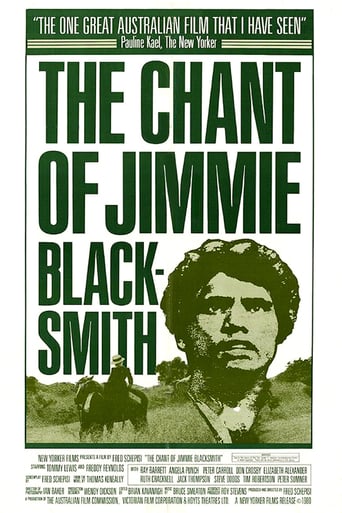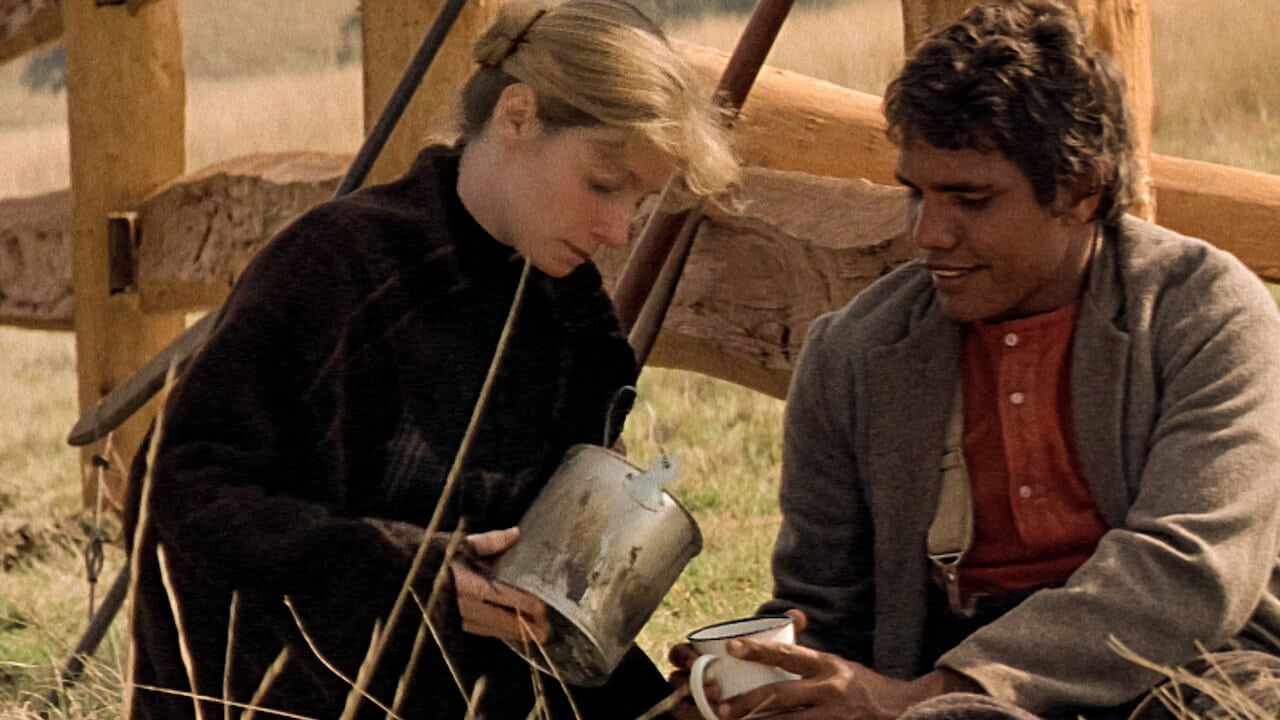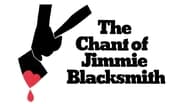bandw
(Spoilers) Jimmy Blacksmith is a young, half-caste Australian Aborigine who has been raised into adulthood by an English minister and his wife. It is 1901 and, as presented, systemic racism is in full effect. To show concern for the Aborigines the minister is intent on "imbuing one with decent ambition." Being half white gives Jimmy an entry into the minister's world, the thinking being that the white half of him might allow him to turn out acceptably well. Jimmy goes along with the thought and tries to fit into the white world, the outcome being that he is tragically caught between two cultures. The minister, seeing that Jimmy has applied himself to getting an education and worked hard, sends him out into the world with a letter of reference. Jimmy takes on fence building at a couple of farms and both times he is given less compensation than agreed on and then given the boot. Then he takes a position with the local police where he obligingly executes the law, even against his own people. After witnessing a monstrous miscarriage of justice he quits that job. Finally Jimmy winds up working on a sheep ranch.The movie is well paced in that with each indignation Jimmy suffers we see his change in attitude from eagerly trying to join the dominate culture to resenting the abuse he suffers because of his race. With each event I also became more indignant. The fuse was set and a sequence of events at the ranch results in a spontaneous explosion of violence. Many may want to avert their eyes during that scene. It left me with conflicting emotions. Everything that happened was perfectly understandable, but hard to condone. When the bad guy finally gets his in a movie, you can usually accept it since he was the bad guy after all. Here the people who are killed are not necessarily bad people. True, they have bought into an evil doctrine, but how many people are independent thinkers enough to buck societal norms?After the killings Jimmy goes on the lam with his brother Mort. The second half of the film deals with tracking them down. And that is not easy, since Jimmy and Mort are skilled at moving about the countryside, being able to move fast and cover their tracks. As a late attempt to stave off the massive search effort Mort and Jimmy take a hostage, a school teacher. The teacher is the unusual person who cares even to think about the problem of racial oppression and how it can lead to violence. He comments to Jimmy and Mort, "You can't say we haven't given you anything. We've introduced you to alcohol, religion, influenza, measles, syphilis, school. A whole host of improvements."The acting is solid, especially considering that playing Jimmy was Tommy Lewis' first screen appearance. The cinematography is noteworthy, with the Australian countryside being used to great effect.Being an American, English subtitles would have helped me.This is based on real events in the life of one Jimmy Governor. Any fictionalized version of real events is always a bit suspect, but this movie has the feeling of authenticity. I hope that is the case, since the movie deals with topics of such gravity that it would be a sin to rewrite the history to any great extent.
Tim Kidner
Fred Schepisi's 1978 film may well be just that but it's not included in my Australian Cinema 12 disc boxed set and I've never known it to be on TV, here. I became aware of it through my old film 'bible' Halliwells and they rated it very highly, awarding a rare maximum score, citing it as 'one of the greatest achievements in Australian cinema'.It's taken me a good number of years to finally find a copy that was on region of DVD I could play and wasn't a silly price.The first thing you notice is the sheer authenticity. Language is as brutal as any and is more akin to a Victorian Scorsese than starched collars and stiff upper lips. The language used to describe the aboriginal natives is as coarse and racist as you'll find in any gritty 70's set LA cop show and for that it is both upsetting and rather embarrassing, but at least goes to show the leaps and bounds humankind has largely made on this issue, since.Jimmie Blacksmith is a half-cast, a subject that has been visited in a few memorable films, particularly 'Rabbit Proof Fence' and as 'these' were often the result of rape against white women, were seen as worse than the lowest. Jimmie (superbly played by Tommy Lewis) does have an advantage, he's overseen by the local white vicar and is known as a hard and honest worker.He soon goes on to work for white farmers, along with his fully aboriginal brother, erecting fences. Miles of them. He does too good a job and they don't want to pay, so he moves on. His relationship with a white girl, then marriage results in a child, that by colour alone, cannot be his. Then, around half-way in, all this pent-up anger boiling up inside the civilised and decent Jimmie erupts. This is when the violence (extreme in its day, now, maybe sadly, average) erupts as he goes on a vengeful killing spree.I need not go further than this, except that obviously, he is then a wanted criminal and a fugitive on the run.There's a real sense of the epic, with cinematic hints and nods to Nicolas Roeg's 'Walkabout', with the natural geography, fauna and the culture all vividly brought to life, superbly filmed by Ian Baker .Thankfully - hopefully, this can now be seen as a historical drama, the like of which can never happen again. It is as hard-hitting and making as powerful a statement on in-bred racism there is and is without doubt a five star classic.
thewholebrevitything
Thomas Keneally's THE CHANT OF JIMMIE BLACKSMITH novel works on so many levels - a period piece, as a biting satire and as a wonderfully composed drama. This film of the same name attempts to capture the poignancy and strength of the original classic novel. It achieves this wonderfully. The film is excellently acted and the violence is both well shot and vibrantly enacted. The score is great too. Also the Australian landscape - not to mention its social underbelly, was never shot with as much insight.An excellent starting point to understand such great Aussie films like the tracker and rabbit proof fence.10/10
davidgoesboating
If you're the sort of person who enjoys being depressed, The Chant of Jimmie Blacksmith is the film for you. A short summary of the film is as follows. Young half aboriginal/half white boy is raised by a white Christian family. As he goes off to find a job, he discovers that every white person in the world is actually a racist. He tries to get over this fact by trying to lose his 'black soul', and become more like a white man. He is constantly cheated and laughed at by his white employers. Of course there is only one thing a decent person can possibly do when faced with this. He goes and chops up a couple of women and young girls with an axe. Sound fun so far? Well it gets better anyway, but I won't give away the whole plot in case you actually want to watch the movie. Of course one might say, but isn't the message important? Well, no. It is true that Aborigines were generally considered inferior at the time, and that there was some racism going on. But this film ruthlessly exaggerates it to prove a point, which appears to be that white society is a corrupter of black people. Leaving aside the negative storyline and the political point-scoring, however, the acting is fairly decent, and score is alright too. Apart from that, don't bother watching this.



 AD
AD





